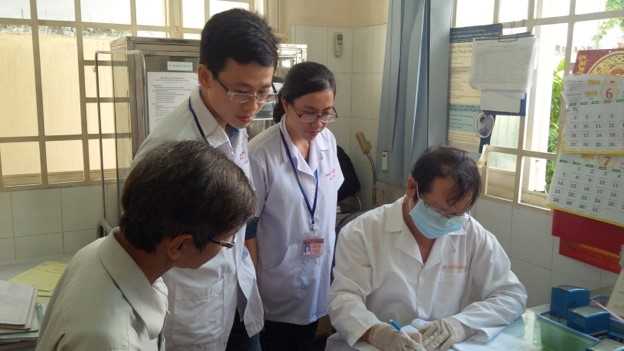Improving medical education and reducing stigma in HIV clinics in Ho Chi Minh City

Figure: Students from Ho Chi Minh city University of Medicine and Pharmacy learning at Tan Binh HIV Outpatient Clinic
A current priority of the Vietnam Ministry of Health (MOH) is to improve the quality of medical education in the country. To support this goal, the Ho Chi Minh City University of Medicine and Pharmacy (HCMC UMP) has initiated an ambitious project to reform and modernize their 6-year undergraduate medical curriculum. A major focus of the reform is to introduce early community-based clinical experiences for students, which are currently lacking. Recognizing an opportunity to leverage PEPFAR’s investments in HIV outpatient clinics and care providers, HAIVN supported the Ho Chi Minh City People’s AIDS committee (PAC) and HCMC UMP to collaborate on a pilot to train medical students in HIV outpatient clinics in the city. The aims of the pilot were to develop a model for community-based medical student education, to improve the capacity of community-based HIV staff to mentor students, improve student history and physical examination skills, reduce stigma, and promote HIV medicine as a potential field for graduating doctors.
Students spent one morning per week over 8 weeks in one of 6 participating HIV clinics in the city. During each session students performed history and physical examinations, and were mentored by the community HIV physician.
Prior to the pilot, less than half of the students reported any previous contact with a person living with HIV and 40% believed HIV could be contracted via hugging and kissing. By the end of the rotation, all students demonstrated improved knowledge, improved their skills and confidence in taking a sexual and substance abuse history, and all reported they were less afraid of caring for patients with HIV. One participating student commented on the pilot: “When I registered for the program…I had some stigma towards PLWHA. However, after working with mentors here and also HIV patients, that fear has gone, and I feel more confident now.”
All participating mentors had increased confidence in mentoring both students and other healthcare workers and reported improved job satisfaction.
Based on the success of this pilot, HCMC UMP and PAC plan to offer this opportunity to additional students in increasing numbers of HIV outpatient clinics. In addition, the lessons learned from this model will support the university’s planned expansion of community-based clinical training opportunities for all students.
- Page last reviewed: March 31, 2016
- Page last updated: March 31, 2016
- Content source:
Global Health
Notice: Linking to a non-federal site does not constitute an endorsement by HHS, CDC or any of its employees of the sponsors or the information and products presented on the site.


 ShareCompartir
ShareCompartir